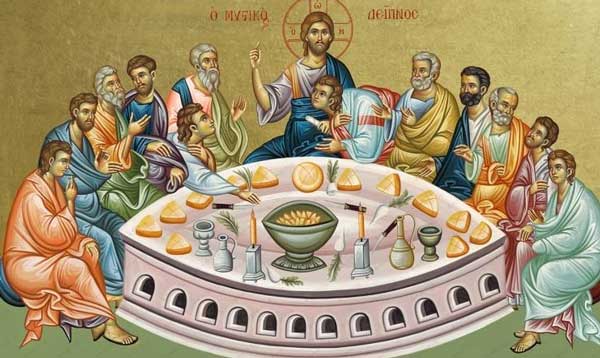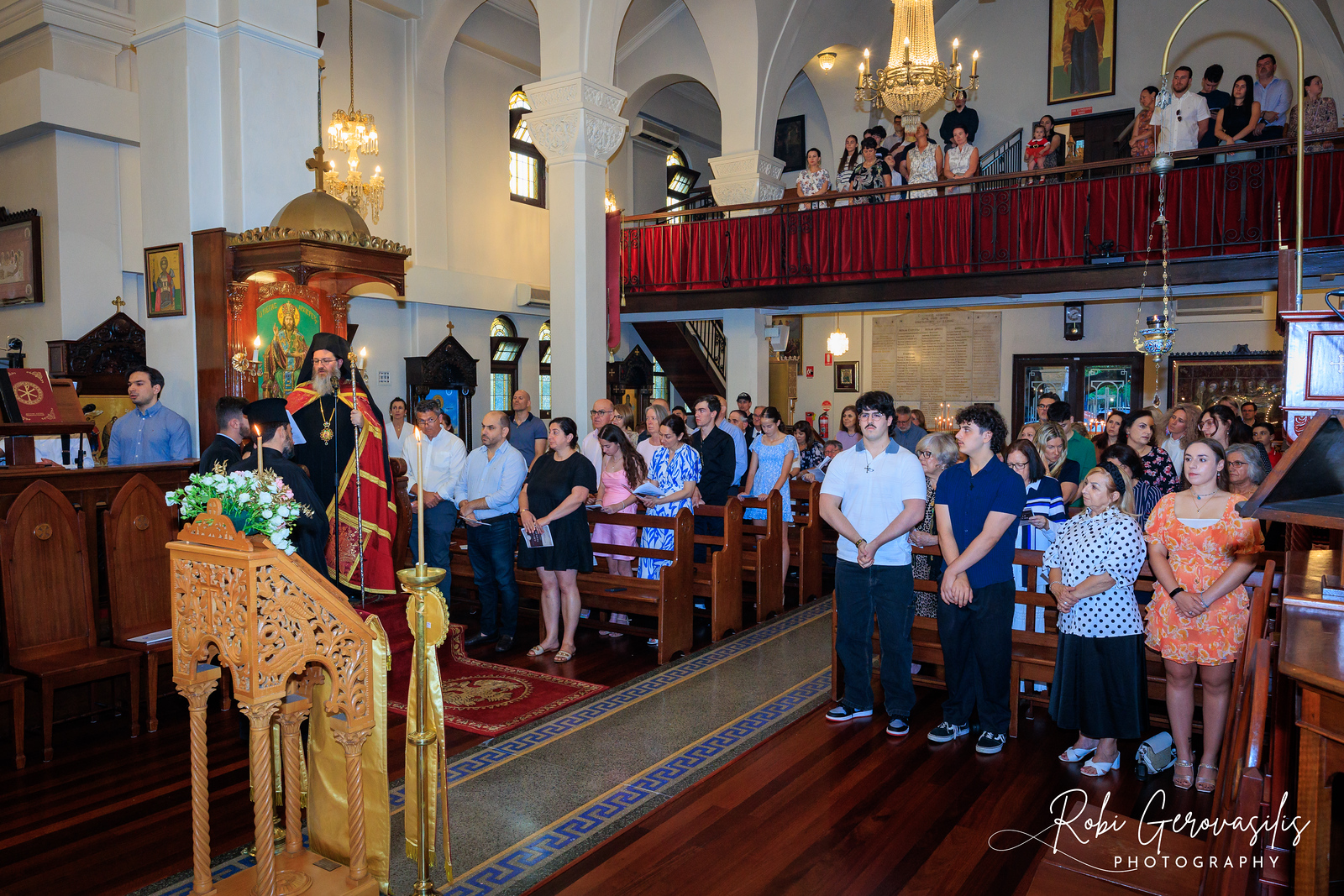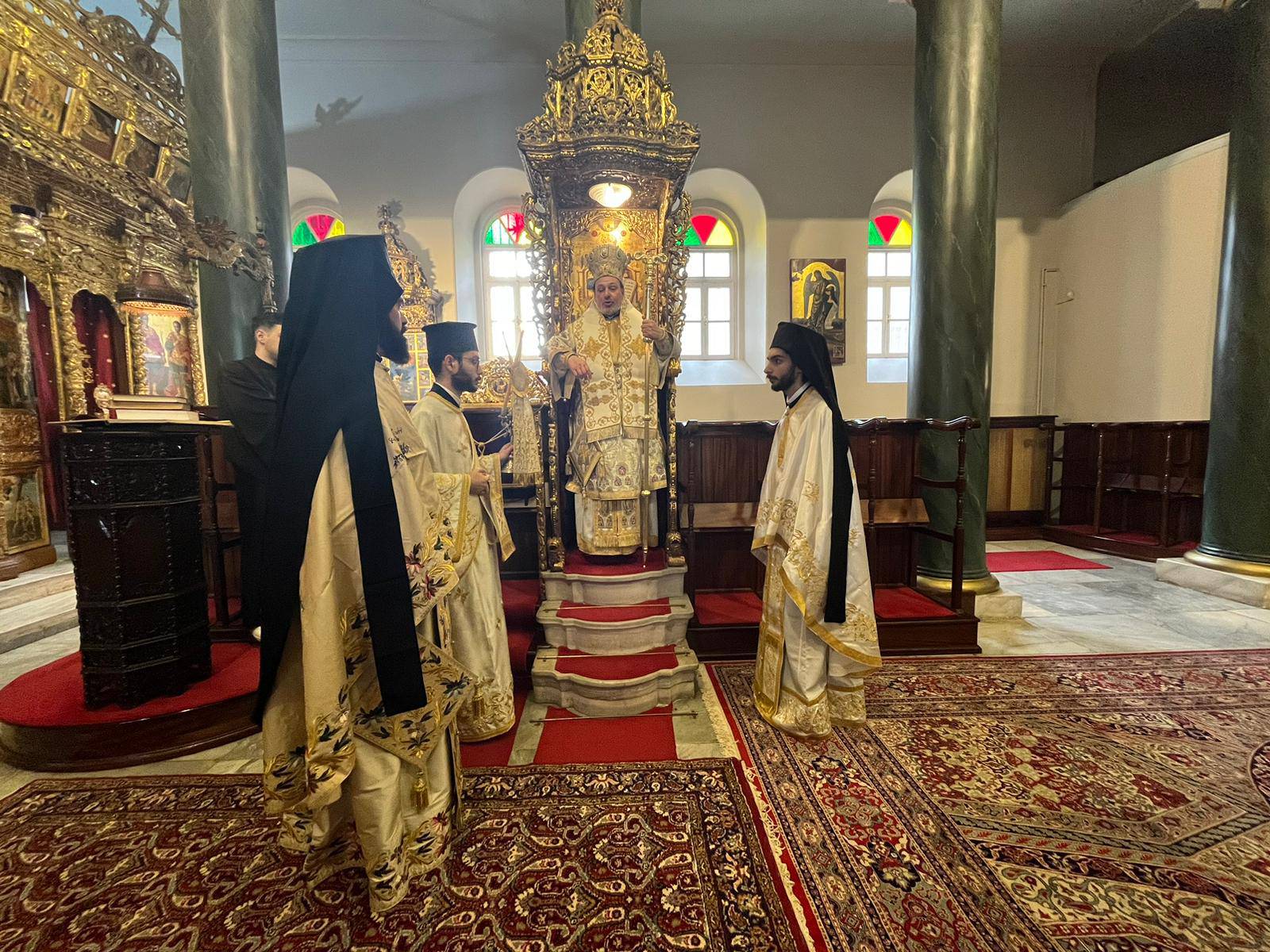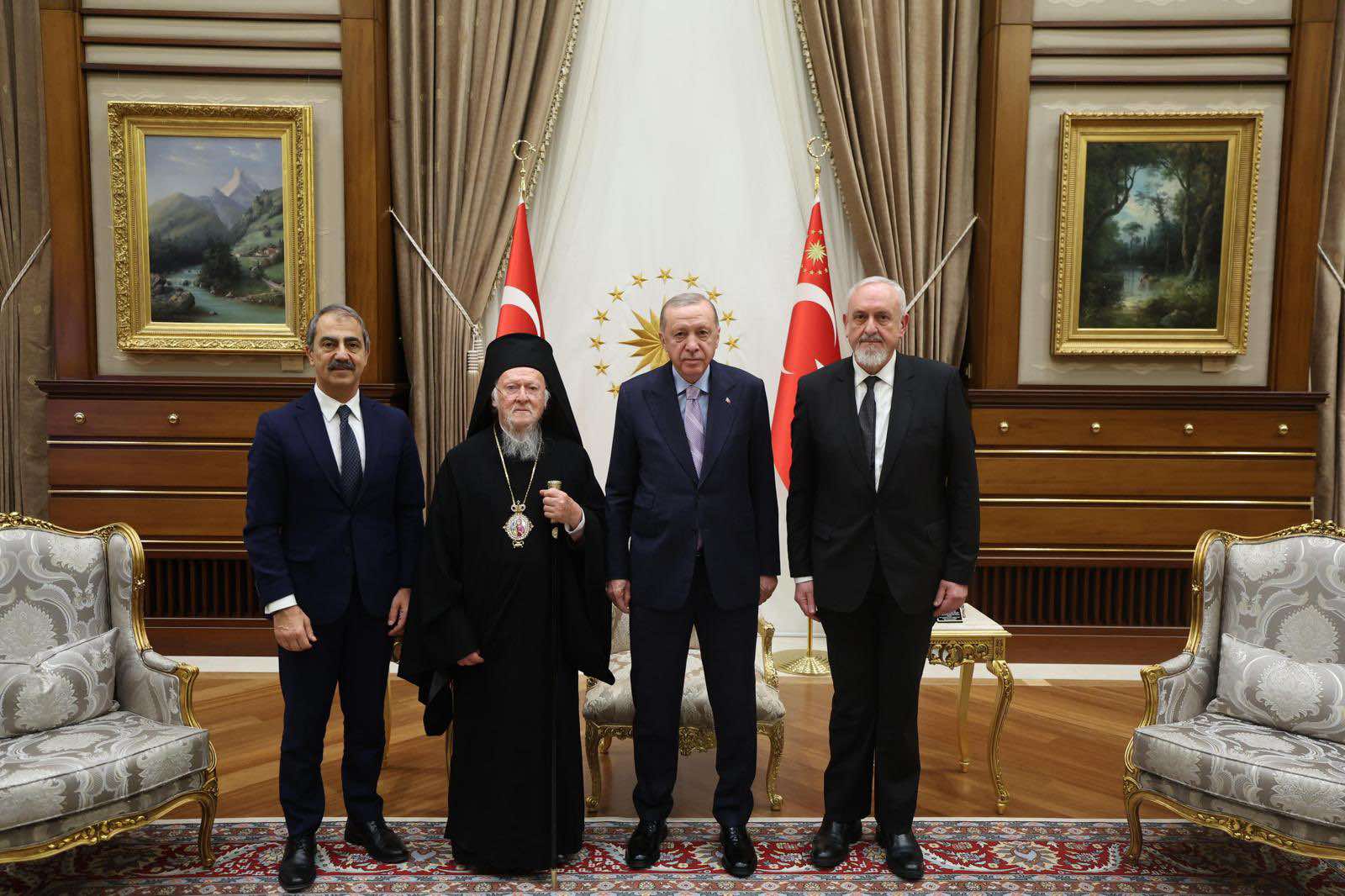An Interpretation of the Hymnography of Matins on Holy Thursday


Introduction
We are at the end of the Bridegroom Services (Monday, Tuesday, Wednesday), which are so named from the troparion “Behold the Bridegroom comes in the middle of the night”, which is sung these days. From Holy Thursday the Services of the Passion begin, that is, the Secret Supper, the Crucifixion and the Burial. Holy Thursday with the Secret Supper is the summary of the next two days, because in it the Crucifixion and the Burial of Christ take place in advance and mysteriously, which are repeated every time a Divine Liturgy takes place, where the mystery of the Secret Supper is revived.
Indeed the Secret Supper is a secret supper and it was held silently without formalities and drumbeats among the disciples, who were enough to represent all people and to create for the first time the Christian community, which will evolve into the Church of God. But it is also a secret, because the mystery of Holy Communion has been handed over, which is the most important event in the entire history of mankind. Let’s take them in order.
Christ, knowing that He is at the end of his mission, is “hastens to the Passion”, not of course out of masochism but out of infinite love for man and in addition because with the Passion He will ensure the salvation of man by completing the plan of Divine Providence. So He orders the disciples to find a place to celebrate the Passover. The choice of time is not random, because the Passover of the Jews will be succeeded by the Passover of the Christians. Christ had already foreseen from which man they would ask for accommodation, to which upper room they would go, because when they went, they found it ready and in order. And when the time came that Christ sat down to eat, so did the Apostles. And before He proceeded to eat, He blessed and changed the bread and wine into His body and blood and gave it to the disciples.
Bread, which “supports the heart of man”, and wine, which “delights the heart of man”, are the two basic elements of the material diet of man. These were chosen by Christ to turn them into basic elements of man’s spiritual nourishment, wanting to emphasize both the material and the spiritual nature of man. Of course, he blessed the bread and fed five thousand men, women and children, just as He blessed the bread when after the journey to Emmaus, Luke and Cleopas with the still unknown companion (Christ) ended up in a house to pass the night. But here the bread becomes the Bread of life, that is, Christ, whom the Christians will eat and they will not die. “He who eats My flesh and drinks My blood abides in Me, and I in him” (John 6:51, 56), and thus the word of Christ will be confirmed once again.
Wine, which comes from the vine, about which Christ made many references in His teaching, when He said: “I am the vine, you are the branches. He who abides in Me, and I in him, bears much fruit; for without Me you can do nothing” (John 15:5). The god of the vine, Dionysios, we meet in Greek literature by this time. And there, of course, the consumption of divine wine, brought “enthusiasm”, that is, the shameless behavior of people, but here the amount of wine, which was changed into the Blood of Christ, brings man back to an enthusiasm, but this enthusiasm makes him rational and prudent.
Another very important action that Christ did is the washing of the Disciples’ feet. The washing of hands was a Jewish custom for reasons of cleanliness, among other things, even by Moses, which also passed into the Christian tradition, which is why outside the churches there were fountains, springs, where they wrote: “Nίψον ανομήματα μη μόνον όψιν” (“Wash your sins, not only your face”) which had the same meaning backward and forward. Christ did not wash the hands but the feet of the Disciples, an act that means respect for the image of God, which He created, but also extreme humility. The first extreme humility is the “kenosis”, that is, the incarnation of Christ, which is completed with this act of extreme humility but also with the parallel teaching: “And whoever of you desires to be first shall be slave of all. For even the Son of Man did not come to be served, but to serve, and to give His life a ransom for many” (Mark 10:44-45).
This example of Christ teaches humility, which is the antidote to the egoism from which man has suffered so much. The poison dart of egoism, which the devil threw at the First-created, poisoned and affected all creation and of course man. It is like the coronavirus, which spread all over the world and infected all people. The vaccine for the coronavirus of egoism does not need research, it is known, it is Holy Communion, the cure for death and the acquisition of immortality. But for such a thing you need to believe, for without faith in spiritual illness and spiritual medicine it is not possible. Christ asked the afflicted to believe that He could do them good, then forgave their sins and finally healed them.
When the glorious disciples were enlightened
then Judas the impious one was stricken
And unto the lawless judges did he
Behold, O lover of money,
flee from that insatiable soul
O You Who are good unto all, Lord, glory be to You.
Interpretation
Judas the disciple of Christ was a controversial figure among the disciples. And this is because “he did not want to agree”, he did not give his heart to his teacher but to something material and cheap, money. He was possessed by the demon of greed and became greedy. At the time of the Secret Supper, at the time when Christ was giving the medicine of immortality, Judas wanted to be hooked on the money. He was lured by the cunning devil with the money and played his destructive game. He had neither sacred nor venerable intentions, but “impious” ones. Not even the last warning of Christ did he take into account, that “one of you would betray Me,” nor did he take it into account then, but ran to the unrighteous judges voluntarily to betray Him. The lawless judges, the scribes and Pharisees, had made the reprehensible decision that they should exterminate the one who bothered them by deceiving the people.
The hymnographer exemplifies the negative example, identifies the problem in the impasse and the catastrophic solution when he ends his life by hanging, and urges our souls to avoid the insatiable thirst for money, the greed that leads to death. But the “ever good Lord” wants “all men to be saved and to come to the knowledge of the truth” (1 Timothy 4:4), for this reason His embrace was open to Judas, as it was open to the harlot and to the thief, and if Judas truly repented, he would be saved.
Judas, servant and deceiver,
disciple and traitor,
friend and false accuser,
was revealed by his deeds.
For he followed the Master,
He said in himself: “I shall deliver Him up
and gain the money that is promised.”
He desired the oil of myrrh to be sold
and Jesus to be taken by deceit.
He gave a kiss and handed over Christ;
and the Lord went as a sheep to the slaughter,
for He alone is compassionate and loves mankind.
Interpretation
Here the contradictions (servant and deceiver, disciple and traitor, friend and false accuser, Christ betrayed with a kiss), which one observes in all the behavior of Judas, are recorded by the hymnographer.
Today the evil Sanhedrin has assemble against Christ
and devised vain things against Him,
plotting to deliver Him, though innocent, to Pilate to be put to death.
Today Judas places round his neck the noose of money,
and deprives himself of life both temporal and divine.
Today Caiaphas prophesies against his will, saying:
“It is expedient that one man should perish for the people.”
He came to suffer for our sins,
that He might set us free from the bondage of the enemy:
for He is good and loves mankind.
Interpretation
This troparion highlights three key points of the Passion, emphasizing them with the “today” as if they were taking place this very day: The wicked congress of the Jews, the hanging of Judas and the involuntary prophecy of Caiaphas.
The cunning and cruelty of the lawless Jewish Congress is manifested in the surrender to death of someone who is primarily not responsible. Of course, this is not the first time, since Socrates had been condemned in this way.
Judas’s financing was the noose that he alone chose to hang himself with and thus be deprived not only of earthly life but also of heaven.
Caiaphas prophesied the truth without knowing it. That is to say, that it was convenient for one, Christ or Barabbas, to die for the good of the world, and Caiaphas considered this to be true. He thought that if Christ was exterminated, the people would be quiet. But Christ was not responsible for the turmoil, but a Savior and by dying He would save all people. How did Caiaphas know this, did he ever read the prophecies about the coming of Christ? Never, which is why he fell like that.
So the truth for Christ is that He came to suffer for our sins and to set us free from the bondage of the wicked one, because He is good and loves mankind.
Instructing Your disciples You initiated, O Lord,
Thou hast taught them saying:
“My friends, take care that fear does not separate you from Me.
For though I suffer, yet it is for the sake of the world.
Do not be scandalized because of me;
for I have come not to be ministered unto, but to minister,
and to give My life as a ransom for the world.
If then ye are My friends, ye will do as I do.
He who will be first, let him be the last;
let the master be as the servant.
Abide in Me, that ye may bear fruit:
for I am the Vine of Life.”
Interpretation
The troparion refers to the second important event during the Secret Supper, the Sacred Washing. In a mystagogical teaching, Christ prepared the Disciples for the terrible events that would follow. No fear, he says, should separate us. This is also emphasized by the Apostle Paul: “Who shall separate us from the love of Christ? shall tribulation, or distress, or persecution, or famine, or nakedness, or peril, or sword? As it is written, For thy sake we are killed all the day long; we are accounted as sheep for the slaughter. Nay, in all these things we are more than conquerors through him that loved us. For I am persuaded, that neither death, nor life, nor angels, nor principalities, nor powers, nor things present, nor things to come, nor height, nor depth, nor any other creature, shall be able to separate us from the love of God, which is in Christ Jesus our Lord” (Romans 8:35-39). Of course the Apostle Paul says this after the verification of all the prophecies in the person of Christ. On the contrary, the disciples were shut away “for fear of the Jews” and waited “willingly” for the Paraclete to inspire them. The Passion of Christ was voluntary in favor of the salvation of the world. The Disciples had not yet understood this, even though Christ was confirming it to them.
The Disciples of Christ misunderstood not only Christ’s weakness on the Cross but also His willingness to wash the Disciples’ feet. All these Disciples were Jews and the Jews were waiting for the Messiah to come triumphantly and majestically, while they see the exact opposite. They cannot understand the new Spirit of Christ, that He came to bring to earth. Christ asks His Disciples to be the example of humility and ministry as proof of the disciple’s authenticity. Finally the troparion repeats what Christ has said many times, that He is the vine and the Disciples the branches, and to stay alive they must be perfectly connected to the stem, to the source of life.
Source: Translated by John Sanidopoulos.




